Get to know the Clean Power & Industrial Efficiency (CPIE) team at NCCETC
This month, we are covering the Clean Power & Industrial Efficiency (CPIE) team at the NC Clean Energy Technology Center (NCCETC).
The CPIE team works to reduce energy intensity by identifying energy efficiency improvements, as well as clean power solutions, such as combined heat and power (CHP), district energy and waste heat recovery applications. The team offers customized, site-specific energy efficiency assessments and analyses to industrial, commercial and institutional facilities throughout the Southeastern United States The team of engineers provides data-driven consultative technical assistance to help clients solve a problem, comply with a mandate, or reach a sustainability goal.
The CPIE team evaluates the consumption of all processes and systems in facilities to help clients make informed decisions on energy expenditures and improvements. The team’s evaluation includes, boilers and steam systems, compressed air systems, lighting, energy-intensive processes, fuel and feedstock flexibility, motors, fans, pumps, process heating, and energy management and automation.
Why is this important to the clean energy industry?
U.S. industries currently account for about one-third of energy use in the United States. Energy-intensive industries use large amounts of energy to chemically or physically transform raw materials into products such as aluminum, chemicals, forest products, glass, metals, mining, and petroleum refining.
Ongoing research and development in this area creates new opportunities for these commercial and industrial facilities to improve the efficiency of their processes through state-of-the-art technology and energy management practices.
Q&A
- What is the team currently working on right now?
As the lead for the US DOE Combined Heat and Power TAP, we’re presently working on updating our work plan for the next budget period. It will include some new ideas within education and outreach that will help us continue building the networks and partnerships with the eight states we represent in the Southeast.
Along with the N.C. Department of Environmental Quality (NC DEQ) and UNC Charlotte’s Energy Production Infrastructure Center (EPIC), our team is coordinating a stakeholder meeting for the Planning an Affordable, Resilient & Sustainable Grid, a U.S. Department of Energy (DOE) funded project that examines storm-related impacts and the cost/benefit of investments in grid resiliency. This particular meeting will include a diverse set of stakeholders that will help draft the various resiliency considerations in order to create a model for the analysis.
- What is something you want people to know about the CPIE team?
We’re a pretty diverse set of individuals between our professional experience, our ages (I think we represent three different generations), and our ethnicities, but something we have in common is that ultimately, we all want to contribute to work we’re proud of and that makes a difference.
Meet the team
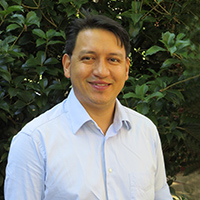
Isaac Panzarella, PE, Assistant Director for Technical Services
Bio: Isaac Panzarella is an Assistant Director at the NCCETC and has worked at the Center since 2010. His primary responsibility is overseeing research projects and technical services for projects involving solar PV and other renewable energy technologies, combined heat and power, microgrids, energy storage and energy efficiency. He is also director of the U.S. Department of Energy’s Southeast Combined Heat and Power Technical Assistance Partnership (CHP TAP), a regional project covering the states of AL, FL, GA, KY, MS, NC, SC and TN, as well as supporting Puerto Rico and the Virgin Islands. Isaac has a mechanical engineering degree from NC State University, and spent 12 years working as a consulting engineer specializing in sustainable building design before coming back to NC State.
Q: What type of expertise do you provide/focus on at the Center?
My training and engineering experience, as well as my creative approach to developing solutions are my key contributions to the Center. I focus on research and technical assistance on all sorts of clean energy technologies, but also cross over into policy and finance support as well.
Q: What are you working on right now?
We are working on many different fronts to help businesses, institutions and local/state governments. One area we are focused on is identifying advanced clean energy projects that will provide them enhanced energy resilience while reducing ongoing energy costs and lowering carbon emissions. Resilience is especially important for critical services and infrastructure, for which the inevitable disruptions caused by widespread grid outages, such as extreme weather events, are not acceptable. Another important effort we are supporting is the state of North Carolina’s process to develop rules to ensure proper decommissioning and the highest possible recycling of renewable energy systems and energy storage devices at the end of their useful life.
Q: What is your favorite part of working on the CPIE team at the Center?
The reason I came to the Center was to be able to work on a variety of projects and to have the opportunity to help more people. Being part of the CPIE team and the larger Center has enabled me to fulfill this purpose and see a positive impact from my work.
Q: What is a project you’ve worked on that you are most proud of or were excited about?
It’s hard to choose one project, but one thing that I enjoy doing is meeting with policymakers at the local level to answer questions they have on how utility-scale solar projects work, and how to leverage these investments for the most benefit while minimizing their impact. Providing this service has given me the opportunity to travel to different communities in the state, present to town and county government officials and have one-on-one conversations about clean energy.
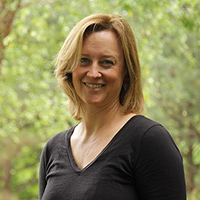
Kimberly Conley, Senior Project Manager
Bio: Kimberly Conley serves as a Senior Project Manager for the CPIE team. She has many years of experience in outreach, extension and engagement. Her efforts in communication and business development highlight the importance of nurturing partnerships and collaborations with the ultimate objective of advocating for the competitiveness of North Carolina’s business and industry. Kimberly leverages the Center’s capabilities in order to meet the needs and objectives of commercial, industrial and government clients as they pertain to energy efficiency and sustainability.
Q: What type of expertise do you provide/focus on at the Center?
I enjoy working with clients to understand their energy challenges and objectives and then identifying ways our team can help them succeed! I also like connecting business and industry to the wide-range of resources we have available in the state.
Q: What are you working on right now?
I’ve been collaborating with key members of the Center to roll out a new suite of services called Energy and Sustainability Services. This is particularly exciting since it combines the Center’s diverse clean energy expertise, into comprehensive solutions for our clients.
Q: What is your favorite part of working on the CPIE team at the Center?
We help clients envision how clean energy alternatives can be incorporated into their facilities. Our approach as an objective party, is to provide unbiased, data driven information to help clients determine the best projects for their needs.
Q: What is a project you’ve worked on that you are most proud of or were excited about?
I’m most proud of the work our collective team has done with the Fayetteville Public Works Commission. They are a very forward-thinking municipal utility that leans on us for our clean energy and policy expertise that often is used to inform strategic direction for the utility. It is a partnership we’re fortunate to have. If I had to pick a project I’m most proud of, it would be the Community Solar project in Fayetteville.
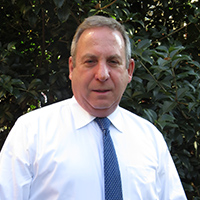
Art Samburg, Clean Power & Industrial Efficiency Coordinator
Bio: Art Samberg is a Program Manager in the CPIE program at the NCCETC. He is also the Assistant Director of the Southeast Combined Heat and Power Technical Assistance Partnership (Southeast CHP TAP), which is a U.S. Department of Energy program intended to promote and assist in transforming the market for CHP, waste heat to power and district energy technologies. Art also manages and assists on renewable energy projects including biomass/biogas-to-energy and wind energy projects. Art joined the Center in 2014, before which he worked as an environmental consultant for 30 years providing air permitting and general consulting for a broad range of industrial clients with a primary focus on siting and licensing energy development projects. Following passage of the Energy Policy Act of 2005, Art assisted several clients in preparation of the requisite environmental documentation supporting U.S. Department of Energy loan guarantees for advanced biofuel projects. Art received his Master’s degree in Meteorology from Rutgers University and his Bachelor’s Degree in Meteorology from Cook College.
Q: What type of expertise do you provide/focus on at the Center?
My primary areas of expertise that are applied at the Center include project management, technical assistance services and client outreach in support of the Southeast CHP TAP project, as well as support on biogas-to-energy projects.
Q: What are you working on right now?
Currently, my primary focus is to work with our team here at the Center to complete several CHP technical evaluations that are underway for facilities within the eight-state southeast region that we cover for the U.S. DOE. I am also working with our team to develop webinars to provide CHP education for various industry sectors.
Q: What is your favorite part of working on the CPIE team at the Center?
There are many ways to define teamwork, but I feel we have mastered the concept here at the Center. Everyone works hard to help their team succeed. There is a consistently high level of enthusiasm by the staff here to help others where needed on their projects.
Q: What is a project you’ve worked on that you are most proud of or were excited about?
I would say that it was a project that we recently completed for the NC Department of Transportation where we conducted a nine-month field study to assess the wind energy potential from vehicle-induced turbulence on interstate highways. We collected data from wind speed measurement systems that we installed along interstate highways at three locations in North Carolina. The data was logged and electronically sent back to the NCCETC where extensive statistical analyses were conducted to estimate the potential quantity of generated wind energy and the cost to capture and utilize it to power highway signs. Our study concluded that vehicle turbulence is a potential source of wind energy though additional technology advancements are required to make the cost of this energy competitive with other renewable sources, such as solar.
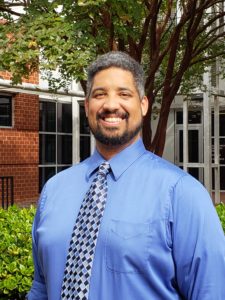
Ted Spencer, Clean Power & Industrial Efficiency Project Engineer
Bio: Ted Spencer is a CPIE Engineer at the Center. He assists in the performance of the Center’s activities under the Southeast CHP TAP and helps develop and implement other projects. He is a native of Charlotte, and spent nine years in the Navy after high school working on aircraft carriers. He holds a degree in Electrical Engineering from NC State University.
Q: What type of expertise do you provide/focus on at the Center?
With my electrical engineering undergrad degree, I focus on renewable energy systems at the Center. I have been working in the industry for the last several years, so I know the engineering landscape. I am currently working on a Masters Degree that will also give me more of a policy background.
Q: What are you working on right now?
Fayetteville PWC opened its solar plant in October, and I am writing a report to tell the rest of the story – trying to learn everything we can from the project in case Fayetteville wants to do another phase or if someone else wants to do the same later – that way we have experience to build on that. I am also working with other government agencies looking at renewables, solar plus storage and similar projects.
Q: What is your favorite part of working on the CPIE team at the Center?
I love working with a great team of people who are passionate about what they do – all coming from diverse backgrounds and learning from them. I also enjoy the fact that there’s a different challenge every day that requires a new solution – I never do the same work twice. We’re doing a lot of good work that is helping people in a variety of ways across the region.
Q: What is a project you’ve worked on that you are most proud of or were excited about?
Seeing the Fayetteville Community Solar Project open up has been rewarding. I’m excited that it can be a model for others going forward.
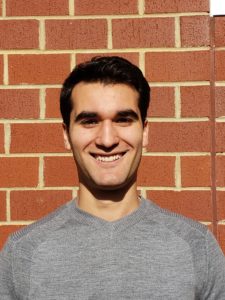
Simon Sandler, Clean Power & Industrial Efficiency Project Engineer
Bio: Simon Sandler is a Project Engineer on the CPIE team. His main tasks are assisting in completing engineering and technical analysis for the different clean power technologies the center works on, including work on the Southeast CHP TAP. Simon has also spent time with solar energy, solar and storage, biogas from multiple sources, microgrids, and some wind work. He also works with the policy team on policy analysis, supporting state rulemaking and stakeholder processes, and writing grants. Simon came to the Center after completing his masters (M.S.) in Sustainable Energy Systems from Rochester Institute of Technology (RIT) where his masters project worked on Microgrids and their economics. Before that, he completed a B.S. in Civil Engineering at the University of Missouri – Columbia. He worked as an intern in the past doing engineering business development for energy projects, a project engineer managing the construction of a hospital, and with University (Missouri) power plant to identify energy saving strategies and goals to convert the campus and its district energy system away from coal and toward all renewable sources.
Q: What type of expertise do you provide/focus on at the Center?
The skills I offer are largely focused around solar, solar and storage, and my background in sustainability and its broader context. While I can complete purely technical analysis for projects such as commercial solar, I also work with clients that are interested in understanding how their energy actions can be aligned with or help achieve sustainability or emission reduction goals.
Q: What are you working on right now?
I always have a smattering of projects on my plate, and right now that includes working on the Planning an Affordable, Resilient, and Sustainable Grid in North Carolina (PARSG) project and helping the Center pursue some grants to work on community microgrids as well as solar recycling in support of the state’s HB 329.
Q: What is your favorite part of working on the CPIE team at the Center?
In effect it is the answer to question three, I get to work on so many different types of projects all the time. I am always learning from a new project or client, whether it is an industry project or a state process, working on a federal grant or writing one, I am always doing something different each day.
Q: What is a project you’ve worked on that you are most proud of or were excited about?
I was super proud to have the opportunity to assist, even in the smallest way near the end of the project, on the Fayetteville Community solar and storage project. While I joined this project after it was near completion, I have been lucky enough to get to continue to work on the Community solar for the Southeast grant and help many other electric cooperatives and municipalities evaluate the potential benefits of solar energy and storage. This is a topic I care a lot about and one that has been educational to me every step of the way.
For more information about the CPIE team and the services they offer, visit the website or contact Kimberly Conley at kjconley@ncsu.edu or 919-515-0903, or contact Isaac Panzarella at ipanzar@ncsu.edu or 919-515-0354.